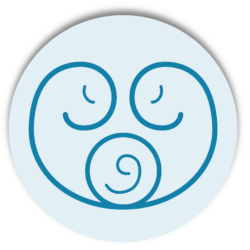Genetic Disorders and Infertility
Genetic issues are the cause of up to 30% of all cases of infertility – and some sources say that percentage is even higher. Genetic causes of infertility in both women and men can be complex and varied. Genetic issues can prevent fertilization, result in failure of an embryo to implant in the womb and cause miscarriage.
In fertility medicine, we have two means of identifying and preventing genetic disorders. One is through pre-conception genetic counseling, the other is preimplantation genetic testing (PGT) of embryos (see below for both).
Genetic disorders in men and women
Specific genetic disorders can cause problems with sperm health in men and infertility. This can include producing no sperm (azoospermia), poor quality of sperm or sperm with ineffective movement. Genetic issues can also result in absence of the vans deferens that transports sperm.
Genetic diseases in women can cause ovulation problems that result in infertility. Genetic disorders can cause congenital abnormalities in reproductive organs, impeding or preventing conception. They can also result in conditions like endometriosis and polycystic ovary syndrome (PCOS) that also can result in infertility.
DNA and genetic mutation
Genes carry our heredity and come in pairs, one from the male and one from the female. Genes are the primary element in DNA (deoxyribonucleic acid) that dictate many aspects of our development, from personality to hair color. Genetic disorders occur due to gene imperfections at birth or by genetic mutation afterward. These disorders can be due to the genes or the chromosomes that carry genes.
Once an embryo is created, either naturally or through IVF (in vitro fertilization), three types of genetic issues can result in live birth failure. These are chromosomal abnormalities, single-gene disorders and multifactorial disease.
Chromosomal abnormalities
Chromosomes are of interest in fertility treatment because chromosome disorders occur in more than half of all first-trimester pregnancy losses. Many of these early miscarriages are due to the random occurrence of a chromosomal abnormality in the embryo. These chromosomal abnormalities also prevent an embryo from implanting for a pregnancy.
In general, genetic diseases caused by chromosomal abnormalities are not inherited, but usually occur as random events during the formation of sperm, eggs and embryos.
Chromosomes are string-like structures that exist in all human cells and contain all genetic material. Each human cell has approximately 30,000 genes, which are made up of sequences of DNA strands of molecules.
Most human cells contain 23 pairs of chromosomes or 46 total. These include chromosomes 1 to 22 (the autosomes) and chromosomes X and Y (the sex chromosomes). However, sperm and eggs contain only 23 single chromosomes (one from each chromosome pair).
During fertilization, each parent contributes one chromosome of each pair to the embryo, producing a normal male (46,XY) or a normal female (46,XX).
Chromosome inversion, chromosomal translocation and microdeletions
Chromosome structure can be rearranged from what it should be, which can also lead to failure of an embryo to implant or miscarriage. An inversion rearrangement is when part of the chromosome is reversed end to end. A translocation is when part of a chromosome breaks off and attaches to another chromosome. A Y-chromosome microdeletion is when part of the Y chromosome is absent, affecting male sperm production.
Chromosome aneuploidy such as Down syndrome
Chromosomal abnormalities – variations from the normal male or normal female structure – may be either numerical or structural. The most common type of abnormality is known as aneuploidy, which is an abnormal number of chromosomes due to an extra or missing chromosome.
Down syndrome, also called Trisomy 21, is the most well-known example of aneuploidy, in this case an extra copy of chromosome 21. (Trisomy means three chromosomes, monosomy means one). Aneuploidy causes many miscarriages.
Other aneuploidy disorders include Klinefelter syndrome, Patau syndrome and Edwards syndrome. Children born with aneuploidy disorders may not survive or may be born with birth defects. For example, Down syndrome affects a child’s brain and body development and can cause several health issues throughout life.
Amniocentesis & other tests to detect aneuploidy
Amniocentesis is a prenatal test that can detect or exclude the presence of aneuploidy in a fetus. This is done by drawing amniotic fluid from the pregnant mother. Chorionic villus sampling is another test for aneuploidy that involves evaluation of placenta cells. Noninvasive prenatal testing is a blood test of the pregnant mother that is used to look for aneuploidy.
Single-gene disorders like cystic fibrosis & Tay-Sachs disease
If either the father’s sperm or the mother’s egg harbors a gene mutation, a resulting embryo might carry a genetic disorder.
Single-gene disorders are usually inherited in one of several patterns depending on the location of the gene (for example, chromosomes 1-22 or X and Y) and whether one or two normal copies of the gene are needed for normal protein activity. Lack of adequate protein causes gene mutations that alter cell functioning.
Ways single-gene disorders are inherited
Autosomal dominant diseases occur when someone carrying one mutated copy of a gene in each cell is affected by the disease. Each affected person usually has one affected parent. These tend to occur in every generation of an affected family.
For X-linked dominant genetic diseases, females are more frequently affected than males. Fathers cannot pass X-linked traits to sons (no male-to-male transmission).
Mitochondrial means that only females can pass on mitochondrial diseases to their children (maternal inheritance). Both males and females can be affected, and mitochondrial diseases can appear in every generation of a family.
Autosomal recessive diseases mean affected individuals must carry two mutated copies of a gene. Parents of affected children are usually unaffected and each carry a single copy of the mutated gene (known as carriers). These do not typically occur in every generation.
Types of single gene disorders
Single cell disorders are passed down in straightforward patterns of inheritance. Though mostly rare individually, together they affect many people. The diseases below are caused by a single gene defect, but mutations can cause differences in the severity of the particular disease.
- Cystic fibrosis.
- Tay-Sachs disease.
- Sickle cell anemia.
- Familial hypercholesterolemia.
- Duchenne muscular dystrophy.
- Fragile X syndrome.
- BRCA1 and BRCA2 mutations.
- Huntington’s disease.
- Congenital deafness.
Multifactorial genetic disorders like diabetes and spina bifida
Multifactorial genetic diseases are caused by a combination of genetic, behavioral and environmental factors. Examples of these conditions include spina bifida, diabetes and heart disease.
While multifactorial diseases can recur in families, some mutations can be acquired throughout an individual’s lifetime such as in cancer. All genes work in the context of environment and behavior. Alterations in behavior or the environment, such as diet, exercise, exposure to toxic agents, or medications can all have influences on genetic traits.
Treatment of these diseases is currently beyond the scope of fertility medicine.
Counseling for genetic disorders
Genetic diseases are a complex topic, and the information here is meant only as an overview of the topic. If you and your partner believe you may be prone to genetic risks as parents, further research is warranted, as is the possibility of pre-conception genetic counseling.
Genetic counselors work as part of a healthcare team, providing information and support to families affected by or at risk of a genetic disorder. They help to identify families at possible risk of a genetic disorder, gather and analyze family history and inheritance patterns, calculate risks of recurrence and provide information about genetic testing and related procedures.
Genetic counselors can help families to understand the cultural, personal and familial implications of genetic risks by providing supportive counseling services, serving as patient advocates, and referring families to other health professionals and or services.
The most common indications for genetic counseling include advanced maternal age, family history of a genetic condition, and suspected diagnosis of a genetic condition. Inherited genetic diseases only affect about 5% of couples. Genetic testing prior to attempting to conceive involves a karyotype, which is an analysis of the chromosomes in a patient’s blood.
For more information or to find a genetic counselor in your area, please visit the National Society of Genetic Counselors.
Preimplantation genetic testing (PGT)
PGT only evaluates embryos created through IVF. This is available before embryo implantation. Using a biopsy of a few cells from a frozen embryo, PGT can identify several genetic disorders that can result in an unsuccessful pregnancy or a child with birth defects.


